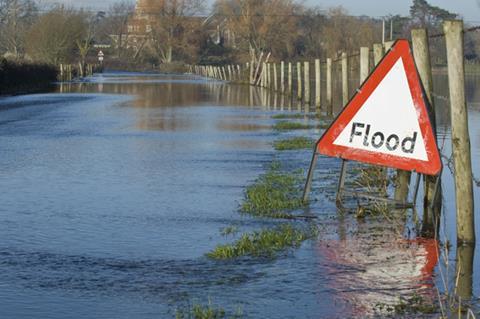How to ensure your business property is watertight as unprecedented storms continue to affect the UK
With 5.8 million small businesses across the UK, local communities and economies count on them to thrive. However, the rise in extreme weather and flooding affects approximately two thirds of small businesses every year.
Storm Ciara and Storm Dennis have caused havoc across the UK in recent weeks. Their resulting floods have caused major disruption to communities and this extends to small businesses.

Bea Montoya, chief operating officer at Simply Business suggests a number of measures that business owners can take to protect their livelihoods against flood damage.
- Stay safe
Flood water is often contaminated and deceptively powerful, so it’s important to make sure your staff or tenants are in a safe place and away from the flooding. You should also avoid any contact with water or electricity during and after a storm until you get the all clear from authorities.
- Contact your insurance company as soon as you can
Flood damage to your property can be a stressful time for business owners so make sure you contact your insurance company as soon as you can to start the claim.
Your call handler should make the process as stress-free and smooth as possible and guide you through the claims process. You should be able to find out quite quickly how you will receive your claim and some providers may offer you help in recoveries and repairs.
- Take photos of the damage
Your insurance company will need a report and evidence of the damage so be sure you take photos as soon as it is safe to do so to ensure you capture the full damage. After the property is clean, keep an eye on the property in case mould begins to develop and if it does, keep track of its growth.
- Protect yourself
Once your insurance company has approved your claim, you can begin to remove the flood damage. Wear protective clothing, such as rubber gloves and boots, to limit the amount you touch the contaminated water and contents.
Soiled soft furnishings, like beds, sofas, cushions, will have to be disposed of in an appropriate manner and disinfect hard surfaces to eliminate the bacteria.
- Protect the property
Open windows and doors to allow air to circulate throughout the property and hire professional cleaning services to ensure the property is clean and dry.
If any windows or points of entry have been damaged, board up the open spaces to make sure the property is as secure as it can be and to prevent further damage from vandalism.
- Prepare for next time
Be aware of any incoming storms so you can take the necessary preparations and preventions to limit the damage. Make sure you read your insurance policy and know exactly what it covers.
Air bricks, sandbags and pumps are easily available in preparation in case your business does flood and moving or securing outside furniture can limit the damage from high winds. If your business premises are in an area that is liable to flood it may be worth investing in specialist equipment.
If your property is likely to flood, evacuate all people in the premise and turn off the water, gas and electricity supplies to minimise the damage to these also.




















No comments yet